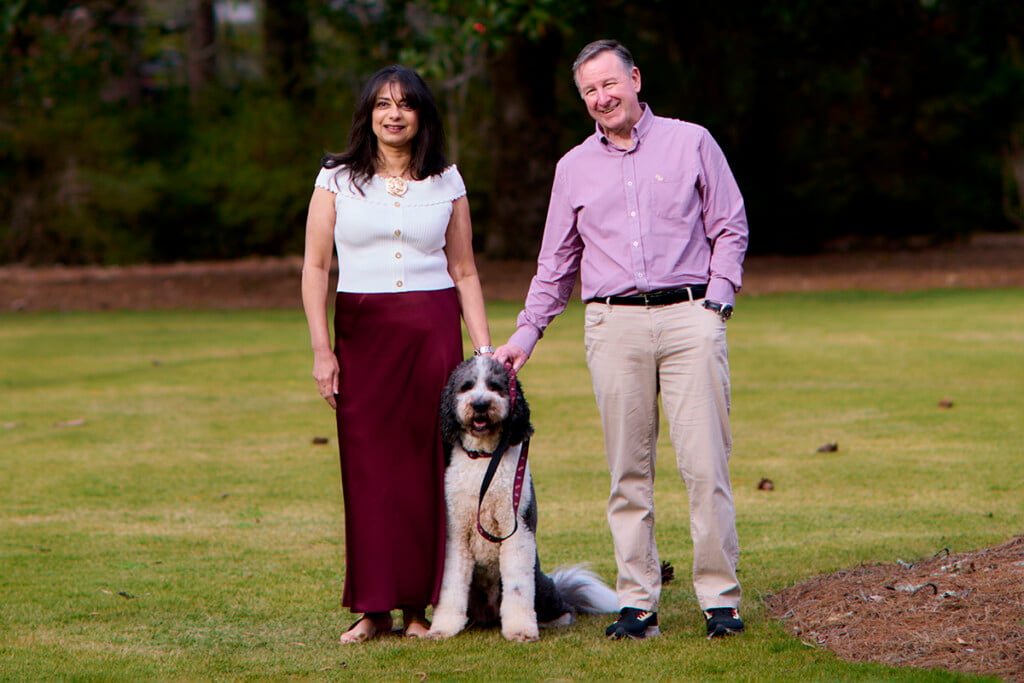An Expansive Vision
FSU is becoming a transformative regional presence

Florida State University President Richard McCullough had arrived in DeFuniak Springs with time to spare and set about looking for coffee.
He wandered into the historic Hotel DeFuniak but left after not seeing anyone right away. He got the attention of a man in a pickup truck.
“Know anywhere I can get a cup of coffee?”
The man advised the stranger that if he were to walk to the back of the hotel, there was a pot brewing there.
“How about a coffee shop? I’d like to sit down someplace.”
The man suggested that the stranger try the Perla Baking Company, located across Baldwin Avenue from the curiously round Lake DeFuniak. Perla is short for “perfect lake.”
“It was a really cool coffee shop,” McCullough would recall a month later. “Nice people.”
The coffee was good and his day was off to a pleasant start, but McCullough had not departed Tallahassee last November intending to rediscover mainstreet America. (DeFuniak Springs’ population is 14% of FSU’s student population.) Rather, he was among 15 representatives of FSU who were about to attend one of the most pivotal and progressive meetings in the school’s 173-year history.
McCullough proceeded to the Walton County Commission chambers, where Triumph Gulf Coast board chairman David Bear gaveled the gathering to order.
Since arriving in the big little city of Tallahassee in August 2021, McCullough and his wife, Dr. Jai Vartikar, had become accustomed to a small-town vibe.
“We’ve lived in a number of places — Pittsburgh, Cambridge (Massachusetts), Baltimore, New York, Dallas — and one of the things that sets Tallahassee apart is that the people are incredibly friendly and welcoming,” McCullough said. “I’m not sure that I’ve ever lived in a place where the people are as nice, engaging and genuine.”

Dr. Richard McCullough and his wife, Dr. Jai Vartikar, gather with family on the occasion of his inauguration as FSU president. Photo courtesy of Office of the President / Florida State University
Vartikar, known affectionately as Dr. Jai (pronounced Jay), agreed and added, “The family atmosphere at Florida State is genuine. It’s more than just collegial. People have your back, and we have felt like members of a very large family from Day 1. We had never felt that before, and we’ve been to some wonderful places.”
Members of the FSU family, McCullough said, have a remarkably strong attachment to the school.
“People love FSU like no other university we have been associated with,” he said. “That’s infectious, and it goes beyond athletics. When you talk to trustees and alumni, their dedication and fondness for FSU is like nothing I’ve ever seen.”
McCullough recognizes that he landed at FSU at a great time.
“The foundation for student success had been built,” he said. “A lot of work had gone into taking FSU from the 44th-ranked university in the country to 18th. And we’ve continued to improve in every category of student success since I arrived. Our retention rate is at a record 96%. Our six-year graduation rate is 85%. Our four-year graduation rate is 75%.
“And even as we are improving in those areas, we are focused on building our research funding in ways that will benefit all of Northwest Florida.”
From Pensacola to Tallahassee. From DeFuniak Springs to Wakulla Springs.
One agenda item on the Triumph board’s Walton County meeting agenda had everything to do with that regional ambition. The board was set to act on an application from FSU seeking $100 million for an Institute for Strategic Partnerships, Innovation, Research and Education (InSPIRE) to be located in Bay County.
FSU dadgum near got what it asked for.
The board supported the proposal with the largest grant award in its history, $98.4 million. InSPIRE will focus on aerospace, advanced materials for aerospace and hypersonic research, areas of concentration that McCullough finds highly consistent with assets and expertise already present in the region.
“The support of Chairman Bear and the board was phenomenal,” McCullough said. “We will build a couple of large facilities near the (Northwest Florida Beaches) airport and hire faculty who will live in the area. We will be involved in everything from basic research to classified research. We expect the workforce development, which is an important aspect of InSPIRE, will attract the attention of major employers.
“Northwest Florida is our backyard, and we are very excited about the project.”
So, too, is Randy Hanna, the dean of Florida State’s Panama City campus, which hosted a February meeting where the term sheet for the InSPIRE grant was approved by the Triumph board.
“InSPIRE will be transformational and have generational impacts,” Hanna told that meeting. “At FSU PC, we look forward to partnering with the project.”
The man in the truck didn’t recognize McCullough the day that he and his team came visiting, but the region will experience their influence soon enough.

Vartikar sits in at a sound board at the FSU Film School. Photo courtesy of Office of the President / Florida State University
In Tallahassee and beyond, McCullough said, FSU’s Vice President for Research Stacey Patterson and its Associate Vice President for Strategic Partnerships and Innovation Valerie McDevitt are building an innovation ecosystem.
“Their efforts,” he said, “will help us increase the number of startup companies and licenses and patents that we are generating at the university.”
McCullough is an entrepreneur himself, having started two companies in Pittsburgh, one that produced materials for OLED televisions and another that is in business today and specializes in inks for printable electronics.
When McCullough starts to rattle off initiatives underway at FSU, it seems that he may not stop: expanded biomedical and life science research capabilities; quantum science and engineering initiatives; new discoveries in physics that promise to transform data storage; new magnetic materials; and government/civic initiatives. The list goes on.
Potentially the biggest of these initiatives centers on the Florida Panhandle. McCullough aims to address the region’s most pressing health needs and challenges by launching a new health care ecosystem stretching from Tallahassee to Pensacola. FSU Health will serve millions by leveraging the expertise and resources of Florida State’s programs in medicine, nursing, social work and public health, as well as its many research centers and community partners.
The first two new FSU Health facilities are under construction. Thanks to a $125 million appropriation from the Florida Legislature, a state-of-the-art research and medical facility being built at Tallahassee Memorial HealthCare (TMH) in Tallahassee will attract world-class physician-scientists doing “bench to bedside” research to discover new diagnostics and therapeutics for clinical use. To the west, Florida State and TMH are partnering with The St. Joe Company to build a new FSU Health TMH medical campus in Panama City Beach.
“It’s a great time to be at FSU,” McCullough said in summary. “There is so much opportunity here.”
Prior to becoming an FSU Seminole, McCullough had served as vice provost for research and a professor of materials science and engineering at Harvard University for nine years. He led the Office of Foundation and Corporate Engagement and assisted in the oversight of more than 25 interdisciplinary institutes, centers and initiatives.
He developed the Harvard Data Science Initiative, a collaboration among 12 of the university’s schools and more than 120 faculty, which led to the creation of three master’s programs and many undergraduate courses.
Previously, McCullough spent 22 years at Carnegie Mellon University in Pittsburgh as a professor of chemistry, department head, dean of the Mellon College of Science and finally, vice president for research.
McCullough grew up in Mesquite, Texas, and attended Eastfield Community College before earning a bachelor’s degree in chemistry from the University of Texas at Dallas in 1982 and a doctorate in organic chemistry from Johns Hopkins University in 1988. He spent two years as a postdoctoral fellow at Columbia University in New York.
Vartikar, too, earned a doctorate in chemistry from Johns Hopkins, where she met her husband when both were graduate students there.
Born in India, she moved to Pennsylvania as a child and graduated as valedictorian of her class at Waynesburg Central High School. She received a bachelor’s degree in chemistry from the University of Pennsylvania.
Prior to coming to FSU, Vartikar served as the associate director of the Harvard Medical School Initiative for RNA Medicine. During her tenure, the number of faculty members involved in the project nearly doubled.
Vartikar and McCullough enjoy spending time with their son Jason; daughter-in-law, Sarah Christian; son Dylan; and two granddaughters, Gladys and Archer.

Richard McCullough and Jai Vartikar inspect student projects during FSU Discovery Days. Photo Courtesy of Office of the President / Florida State University
As FSU’s First Lady, Dr. Jai has emerged as an ambassador for the arts and is jazzed about a legislative appropriation that will pay for planning an arts district, a concept that has been talked about, she said, for about 15 years.
“I meet a lot of people who are interested in the arts but don’t know everything that is going on here,” Vartikar said. “At FSU, we need to identify ways to better let the world know how great we are. I’m doing that with the arts, specifically.”
She has met with arts faculty and students and familiarized herself with programs and facilities. She has found that the arts intersect with many aspects of the university.
“We have a music therapy program that is one of the top programs in the nation,” Vartikar said. “We have an art therapy program. Our film school rivals the big names like NYU and USC — New York City and Hollywood, basically — in placing our students in the motion picture industry.”
Vartikar also has grown close to FSU’s Center for Academic Retention and Enhancement (CARE), which focuses on first-generation students.
“One of the first things I did in my role was to visit the CARE program,” she said. “I had a roundtable discussion with several of the students and left incredibly impressed and proud. I fell in love with everyone and everything there. We’re the leader in programs like it. I have heard students say that there is nowhere else they could have gone and been
as successful.”

President McCullough and First Lady Vartikar meet with James Frazier, dean of the FSU College of Fine Arts. Photo courtesy of Office of the President / Florida State University
FSU was recognized with the nation’s top student success award from the Association of Public and Land-Grant Universities.
“A college education is so important to social mobility,” Vartikar said. “I am not a first-generation student, but my husband is.”
CARE supplies its students with coaches who help them navigate classes, the campus environment and practical matters like personal finances. Some CARE students are homeless. Nonetheless, CARE students graduate at the same high rate as FSU’s general population, McCullough pointed out.
“At FSU, it doesn’t matter where you come from,” Vartikar said. “What matters is that you’re here.”


